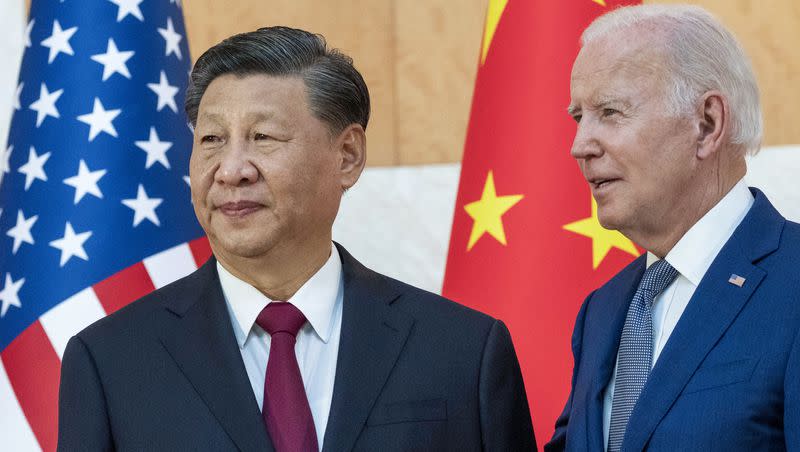Biden calls Xi a ‘dictator’ after Blinken’s China trip

- Oops!Something went wrong.Please try again later.
- Oops!Something went wrong.Please try again later.
- Oops!Something went wrong.Please try again later.
After U.S. Secretary of State Antony Blinken visited Beijing over the weekend in an effort to improve relations with China, President Joe Biden described the country’s leader Xi Jinping as a dictator, prompting a response from China’s foreign ministry.
“The reason why Xi Jinping got very upset in terms of when I shot that balloon down with two box cars full of spy equipment is he didn’t know it was there,” Biden told attendees at a fundraising event in California Tuesday. “That’s what’s a great embarrassment for dictators, when they didn’t know what happened.”
Biden said the balloon was blown off course and Xi didn’t know about it.
“It was blown off course up through Alaska and then down through the United States and he didn’t know about it,” Biden said. “When it got shot down, he was very embarrassed. He denied it was even there.”
Chinese Ministry of Foreign Affairs spokesperson Mao Ning called Biden’s remarks “ridiculously absurd and irresponsible,” according to a CNBC translation.
“It is a grave disregard for basic facts, a serious breach of diplomatic protocol, a serious violation of China’s political dignity and amounted to open political provocation,” she said. “China expresses strong dissatisfaction and firm opposition.”
Biden’s comments come after Blinken met with Xi, Foreign Minister Qin Gang, and other Chinese leaders on Sunday and Monday. State Department spokesperson Matthew Miller said of the visit that there was “candid, substantive and constructive discussions on key priorities in the bilateral relationship and on a range of global and regional issues.”
Miller said Blinken “emphasized the importance of maintaining open channels of communication across the full range of issues to reduce the risk of miscalculation” and that the U.S. and China agreed to further engagement in Beijing and Washington, D.C.
During his remarks at the California fundraiser, Biden said Blinken “did a good job” in China, but he said improving U.S.-China relationship is “going to take time.” When discussing Japan and U.S. allies in Southeast Asia, Biden said China “has real economic difficulties.”
Related
“The world is changing, and we have an opportunity to not take advantage of it at everyone else’s expense, but to change the dynamic in the world,” Biden said.
The Biden administration faces challenges in improving the U.S. relationship with China, including the countries’ disputes over Taiwan and human rights issues. The State Department said the two countries both believe they can work together on climate change, global macroeconomic stability, food security, public health and counter-narcotics.
The U.S.’s relationship with China is a political issue, and many American voters say they are concerned about China heading into next year’s election.
Americans’ favorable opinion of China reached a record low 15% in a March Gallup poll. The poll found 66% of American adults believe China’s military power is a critical threat and 64% believe its economic power is a critical threat. Republicans had the lowest favorable rating of China at just 6% with Democrats and independents about even at 18% and 17%, respectively.

